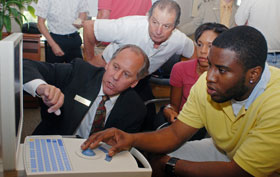  |
| HOME | THIS ISSUE | CALENDAR | GRANTS | BACK ISSUES | < BACK | NEXT > |
Course helps dentists bring latest technology into practiceby Carolyn Pennington - September 10, 2007 | ||||
| By combining research, innovative technology, and business know-how, a dental professor at the UConn Health Center is pioneering an emerging dental specialty known as Biodontics. Dr. Edward Rossomando, a professor of craniofacial sciences at the School of Dental Medicine, has developed a program that moves biotechnology more efficiently from scientists and inventors to dental practitioners. Biodontics has become a specialized educational program that introduces the entrepreneurial process to dental students, faculty, and practitioners. Students in the program get first-hand experience using the most advanced dental products, equipment, and therapies, thanks to dental equipment manufacturers and scientists who present their new tools to the class. They recently learned, for example, about vaccines for tooth decay, and received hands-on training with a new laser that cuts out cavities almost without pain. The UConn program has attracted dental students from prestigious schools across the country including Howard, Marquette and New York Universities, and the University of Southern California. “I think the most important experience I got out of the course was the understanding that dentistry is much more than drill and fill,” say Todd Lyman from Marquette dental school, who recently completed the Biodontics course. “I now look at the way we do things in dentistry or patient care in general, and I look for new and better ways to provide the best care possible.” Rossomando says, “Most dentists realize it is in the best interest of their patients to introduce new products and technologies into their practice. But existing office routines and habits can present obstacles to change.”
His research has found that dentists often believe they can’t afford to stop treating patients in order to adopt new technologies or learn new procedures, not realizing that new products and technologies can allow them to treat larger numbers of patients more efficiently. Rossomando hopes that teaching dental students the principles of entrepreneurship and how to be early adopters of new technology will create dental practitioners capable of effectively incorporating new procedures and therapies into their practices for the benefit of patients. The National Institute of Dental and Craniofacial Research, a branch of the National Institutes of Health, has awarded Rossomando grant money to bring the concept to educational reality. “The face of dentistry is changing at a very rapid pace,” says Lyman, the student. “This course helped me catch a glimpse of what lies ahead, and as such, I feel I am better prepared for the future of dentistry as a whole.” |
| ADVANCE HOME UCONN HOME |

